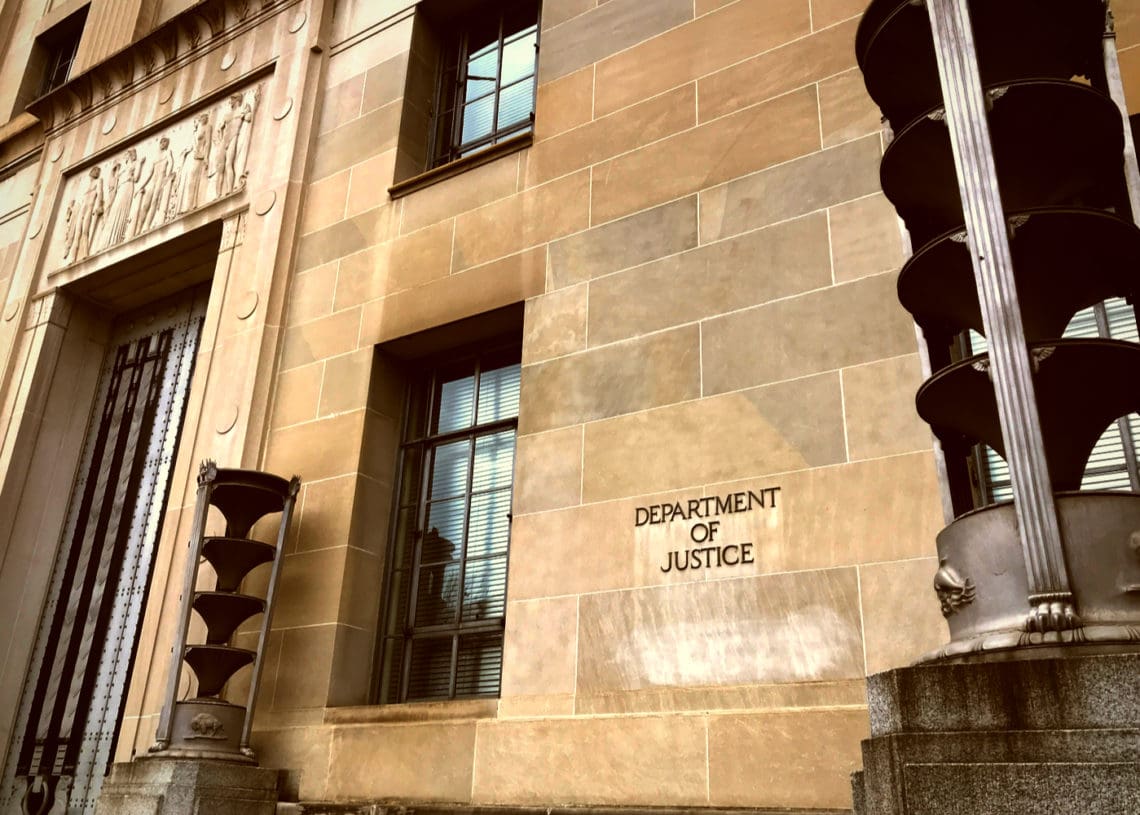DOJ’s latest remarks (via Deputy Attorney General Lisa Monaco) on corporate criminal enforcement carry important implications for compliance teams. Going forward, the department will take a wider view of companies’ past wrongdoing, require more detailed information on individuals related to actions in question and allow for the broader use of monitorships.
Over the last year, the Biden Administration announced policies and rolled out a series of initiatives, signaling a strong commitment to corporate criminal enforcement. Many of these developments, particularly in the latter half of 2021, set the stage for aggressive Department of Justice (DOJ) enforcement efforts and offer insight into the Department’s enforcement priorities heading into 2022. This article provides an overview of DOJ’s enforcement priorities and offers best practices for corporations and their counsel to manage the heightened scrutiny.
This year, we should expect to see an increase in corporate criminal enforcement, driven by the policy changes to corporate criminal enforcement that Deputy Attorney General Lisa O. Monaco announced in October, and the Biden Administration’s multilateral strategy to combat corruption and illicit financing in the broadest sense. The Biden Administration has directed the employment of a range of resources and enforcement mechanisms, from the Foreign Corrupt Practice Act (FCPA), to sanctions and export control regimes, to anti-money laundering laws, and crimes involving cryptocurrency. This directive, coupled with major policy shifts and a surge of resources, indicate an intent to root out and hold bad actors accountable.
The policy changes announced by DAG Monaco revert back to the spirit of the Yates Memo and its focus on individual responsibility and accountability. DOJ removed some of the discretion companies previously had to determine who was substantially involved in wrongdoing. Companies under investigation by DOJ, seeking to receive cooperation credit will have to ensure they identify all individuals involved in corporate wrongdoing, and not just those substantially involved for the government. Companies will also have to produce all non-privileged information about those individuals’ involvement. As a result, companies will want to recalibrate how they make decisions about disclosures and cooperation.
Shifting Corporate Criminal Enforcement Policies
Last fall, Deputy Attorney General Monaco laid out three significant changes to its corporate criminal enforcement policies:
- Companies must provide DOJ with all non-privileged information about individuals involved in or responsible for the misconduct at issue in order to be eligible for cooperation credit. This is a shift from prior policies that gave companies more leeway regarding disclosures, limiting it to individuals who were determined to be “substantially involved” in misconduct. DAG Monaco explained that such a distinction is usually confusing in practice and gives companies too much discretion in deciding whether information about any particular individual should be disclosed to the government.
- DOJ will consider the full criminal, civil and regulatory record of a company under investigation when looking at a company’s potential recidivism to determine the appropriate resolution. Prosecutors will assess actions beyond DOJ, including cases in other jurisdictions, domestic and foreign, and cases involving state enforcement authorities. DAG Monaco stated that a record of misconduct speaks directly to a company’s overall commitment to compliance and fostering a culture that disincentivizes criminal activity.
- Corporate monitorships will not be disfavored. Prosecutors may require the imposition of independent monitors whenever appropriate or necessary to satisfy the DOJ that a company will meet its compliance and disclosure obligations under deferred prosecution agreements (DPAs) and non-prosecution agreements (NPAs). Decisions about monitors will be made based on the facts and circumstances of each case. DAG Monaco stated, “To the extent that prior Justice Department guidance suggested that monitorships are disfavored or are the exception, I am rescinding that guidance.”
While it remains to be seen how these policies will be applied by prosecutors in practice, DAG Monaco’s speech at the ABA’s 36th National Institute on White Collar Crime set the tone for an aggressive enforcement posture. She stated that it was “unambiguously” DOJ’s “first priority in corporate criminal matters to prosecute the individuals who commit and profit from corporate malfeasance.” She recognized that cases against corporate executives are among the most difficult the government brings. She nevertheless urged prosecutors to be bold and commence cases undeterred by the fear of losing. DAG Monaco noted that these policies are just the start of the administration’s efforts to better combat corporate crime.
Combatting Corruption and Illicit Financing
Last June, President Biden established the fight against corruption as a national security priority when he issued his first National Security Study Memorandum (NSSM). The memorandum emphasized the cost of corruption, explaining that acts of corruption deplete two to five percent of the global gross domestic product, and directed agencies to employ all enforcement mechanisms at their disposal. The NSSM specifically directed a 200-day interagency review—consisting of over a dozen agencies including the Department of State, the Department of the Treasury, DOJ, DHS and the CIA—to culminate in a report with recommendations on how the U.S. government and its partners can “promote good governance; bring transparency to the United States and global financial systems; prevent and combat corruption at home and abroad; and make it increasingly difficult for corrupt actors to shield their activities.” In December, the Administration issued its first-ever United States Strategy on Countering Corruption (“USSCC”) which laid out a comprehensive approach to fighting corruption and related crimes.
The Biden Administration has made it clear that it plans to “vigorously enforce” the FPCA and a range of other statutory and regulatory regimes through criminal and civil enforcement actions. The administration strategy called on DOJ to continue to vigorously pursue the enforcement of foreign bribery cases through the FCPA, money laundering charges, and forfeitures. Consistent with President Biden’s priorities, last summer DOJ announced its intent to take a new approach to FCPA enforcement, and proactively investigate and develop FCPA cases. The USSCC also noted that DOJ will work with other governments to enact similar laws and regulations regarding bribery, and called on DOJ to employ new tools to prosecute money laundering crimes, including DOJ’s expanded subpoena power for certain financial records maintained abroad, and financial incentives to report Bank Secrecy Act violations—changes made in sweeping anti-money laundering legislation passed at the beginning of 2021.
The government has also signaled a focus on sanctions and export control enforcement, and crimes involving cryptocurrency. The administration announced its commitment to “taking new steps” to hold corrupt actors accountable including strengthening targeted anticorruption sanctions under the Global Magnitsky Act, and bolstering criminal and civil enforcement actions, such as under DOJ’s Kleptocracy Asset Recovery Initiative. The USSCC noted that since 2010, the Kleptocracy Asset Recovery Initiative has facilitated the recovery and return of more than $1.7 billion in corruption proceeds. In an October speech, DOJ’s Principal Associate Deputy Attorney General, John Carlin, emphasized the “critical” nature of sanctions enforcement and explained that industries should expect a recent uptick of sanctions and export control investigations to continue.
In the same speech, Mr. Carlin explained that cases involving cryptocurrency were another area “ripe for innovation and vigorous enforcement.” His remarks reflect a wider effort of the Biden Administration to deter crimes that utilize cryptocurrency, including ransomware attacks, money laundering, fraud, and terrorist financing. The Biden Administration’s focus on cryptocurrency has also led to the launch of the National Cryptocurrency Enforcement Team (NCET), which will include members of DOJ’s Money Laundering and Asset Recovery Protection Section, Computer Crime and Intellectual Property Section, as well as assistant U.S. attorneys from offices across the country who will conduct investigations and prosecutions involving criminal misuse of cryptocurrency. The USSCC noted that the NCET would particularly focus on crimes committed by virtual currency exchanges, mixing and tumbling services, and money laundering infrastructure actors.
Prioritizing Latin America
The United States also committed to focus on rooting out anti-bribery and corruption in the Northern Triangle countries – Guatemala, El Salvador, and Honduras – through the Northern Triangle Anticorruption Task Force, announced in June 2021. This task force focuses on investigations, prosecutions, and asset recovery related to corruption, through FCPA enforcement, counter-narcotics prosecutions, and the Kleptocracy Asset Recovery Initiative, which is focused on recovering assets linked to foreign corruption and prosecuting related money laundering. In October, the task force launched a tip hotline to assist in mandate. Furthermore, DOJ’s Office of Prosecutorial Development, Assistance, and Training (OPDAT) and the International Criminal Investigative Training Assistance Program (ICITAP), in coordination with the State Department, will work with local prosecutors and investigators to support their efforts to prosecute smuggling and trafficking networks, and develop leads that can be pursued by the Kleptocracy Asset Recovery Initiative.
Recommended Best Practices
While it remains to be seen how many of the initiatives and announcements outlined above will shape enforcement actions in the coming months, one thing is certain: Companies operating at a global scale are subject to heightened scrutiny now more than ever. Companies must actively review and strength test their existing compliance programs to ensure they are effective. Corporate compliance programs should be actively detecting, monitoring and remediating misconduct in the first instance. Companies should be able to demonstrate to regulators the extent of internal efforts to prevent misconduct in the event such a compliance issue were to come to light. Dedicating resources to bolster compliance and training efforts will pay dividends down the road. The costs of a government investigation spanning years and a settlement can skyrocket quickly and have devastating effects for some companies.
Companies should review their compliance programs with an eye toward ensuring, at a minimum:
- Compliance with anti-money laundering and know your customer regulations in various jurisdictions.
- Companies take action beyond relying on their financial institution partners’ compliance programs, to make sure risks raised by services and products that involve cryptocurrencies are properly mitigated.
- Relevant firms are prepared to comply with increased regulation of cryptocurrency transactions that may be on the horizon.
- Firms are ahead of the curve with the implementation of new regulations on the horizon applicable to their business, and understand the risks of failing to do so.
The policy changes announced by DAG Monaco revert back to the spirit of the Yates Memo and its focus on individual responsibility and accountability. DOJ removed some of the discretion companies previously had to determine who was substantially involved in wrongdoing. Companies under investigation by DOJ, seeking to receive cooperation credit will have to ensure they identify all individuals involved in corporate wrongdoing, and not just those substantially involved for the government. Companies will also have to produce all non-privileged information about those individuals’ involvement. As a result, companies will want to recalibrate how they make decisions about disclosures and cooperation.
Companies amidst settlement and negotiating resolutions with the government should keep in mind that prosecutors will review a company’s complete criminal, civil and regulatory record in determining the appropriate resolution in a matter. The shift in policy is driven by the view that a company’s record of misconduct speaks directly to its overall commitment to compliance and fostering a culture that disincentivizes criminal activity. Although her remarks did not make clear how a wide range of conduct involving potentially disparate parts of a company will be evaluated, DAG Monaco’s memorandum to prosecutors stated that some prior instances of misconduct may prove less significant. At the same time, recidivist companies may find that NPAs and DPAs may be off the table. Furthermore, decisions about corporate monitors will be made on the facts of a case. Companies with a robust compliance program in place will be better positioned to assure prosecutors of its ability to meet compliance and disclosure obligation without the imposition of a monitorship. As DAG Monaco noted, the policy changes DOJ has begun implementing are just the start of the administration’s efforts to tackle corporate crime. We should expect to see additional policy changes this year.













